Dutch and Belgian Patients Re-Infected With Coronavirus

Amsterdam/Hong Kong: A patient in the Netherlands and another in Belgium have been confirmed as having been re-infected with the coronavirus, Dutch national broadcaster Nos reported on Tuesday (Aug 25), citing virologists.
The news follows a report this week by researchers in Hong Kong about a man there who had been re-infected four and a half months after being declared recovered.
The Nos cited virologist Marion Koopmans as saying the Dutch patient was an older person with a weakened immune system.
She said that cases where people have been sick with the virus a long time and it then flares up are better known.
But a true reinfection, as in the Dutch, Belgian and Hong Kong cases, requires genetic testing of the virus in both the first and second infection to see whether the two instances of the virus differ slightly.
Dr Koopmans, an adviser to the Dutch government, said reinfections had been expected.
"That someone would pop up with a reinfection, it doesn't make me nervous," she said. "We have to see whether it happens often."
The Belgian patient had mild symptoms, the Nos cited virologist Marc Van Ranst as saying.
But "it's not good news", he added.
He said the case shows antibodies the patient developed during the first exposure were not enough to prevent a second case with the slightly different variant of the virus.
He said it is not clear whether such cases are rare or whether there are "many more people who could have a reinfection after six or seven months".
In Hong Kong, the 33-year-old man’s second Sars-CoV-2 infection was detected via airport screening on his return to Hong Kong from Europe this month.
Researchers at the University of Hong Kong used genomic sequence analysis to prove that he was infected by two different strains.
The information technology worker did not develop any symptoms from his second infection, which might indicate “subsequent infections may be milder”, the researchers said.
“Our findings suggest that Sars-CoV-2 may persist in humans,” Dr Yuen Kwok-Yung and his colleagues said on Monday in a paper accepted for publication in the journal Clinical Infectious Diseases.
The findings also suggest that Sars-CoV-2 is reminiscent of the coronaviruses that cause the common cold, and may continue to circulate “even if patients have acquired immunity via natural infection or via vaccination”, they said.
While some patients have tested positive for the virus over many weeks, even after their symptoms have resolved, scientists have not fully understood whether these cases reflect lingering traces of the virus, a re-eruption of an infection, or a new infection.















































